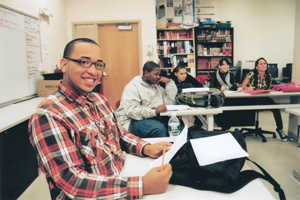Effectively engaging middle and high school students offers constant challenges — and the best possible rewards. Engaging Schools helps educators effectively address these challenges so adults and students in the school community can enjoy the rewards of productive, joyful learning.
Engagement Is the Key to Learning
Too many middle and high school students experience school as irrelevant or boring. They may lack motivation and perseverance. Or, despite educators’ intentions and efforts, students may believe that the adults in their schools don’t care about or understand them.
Too many students are stagnating, not learning. And that puts them at increased risk of struggling academically or behaviorally, finishing high school without adequate postsecondary preparation, or dropping out — risks that are magnified for students facing personal, economic, or other difficulties.
Engaging Schools helps educators more effectively engage students with their teachers, their classmates, and their schoolwork, countering problems and setting students on the path to success. And we do so in the context of increasing demands, including implementation of the Common Core State Standards and growing expectations for teacher evaluation. The result is schools that are able to successfully educate their students and remain true to their core ideals — all while improving the satisfaction of both the students and adults in their schools.
Engaging Schools collaborates with middle and high school leaders, teachers, and staff members to build a learning-focused culture and shape a caring, respectful, and welcoming climate. Our approach to teaching and learning makes classrooms and schools engaging places where students and teachers work together to sustain high levels of success.
We help schools to cultivate the habits of learning that are essential to student success both in and out of the classroom. These habits of learning incorporate critical noncognitive factors, such as academic mindsets and behaviors, and social and emotional competencies that have been shown to have a significant impact on academic success and healthy development.
Engaging Schools collaborates with school leaders, supporting them as they develop a holistic vision, set priorities, make plans, and get everyone in the school on the same page. Our consultants provide experiential, engaging, and sustained professional development for all staff members. We build capacity at multiple levels in schools and districts, and we help educators leverage their strengths.
Some schools or districts may focus on planning for systematic, sustained support for each and every student. In these schools, for example, all teachers might learn to provide universal academic and behavior supports in the classroom and be part of interventions for more chronic problems. These schools also may develop advisory programs so that all students are part of a peer cohort and have at least one adult who can advise, coach, and advocate for them.
Whatever a school or district’s goals, Engaging Schools delivers real-world guidance. Faculty and staff members get practical tools and strategies that they can begin using immediately and that support their long-term practice. We have partnered with all types of schools, and we have special expertise working with underserved schools that serve high percentages of students with the most urgent needs: low-income students; students who are struggling academically; and students who need extra support to address social, emotional, or other challenges.
As a result of Engaging Schools’ work with schools and school districts, students:
- Are better prepared to master complex academic content and meet the heightened demands of the Common Core State Standards.
- Become active participants in their own education and are motivated to be successful.
- Can solve problems and work effectively with their peers.
Over time, students in engaging schools benefit from:
- Improved academic achievement.
- Healthier social and emotional development.
- Increased postsecondary access and success.
- More active participation in and contributions to their communities and our democracy.

“The 2013 Gallup Student Poll found that participants who strongly agree with these two statements are 30 times as likely to be engaged at school as those who strongly disagree: (1) ‘My school is committed to building the strengths of each student.’ [and] (2) ‘I have at least one teacher who makes me excited about the future.’”
Gallup, State of America’s Schools

